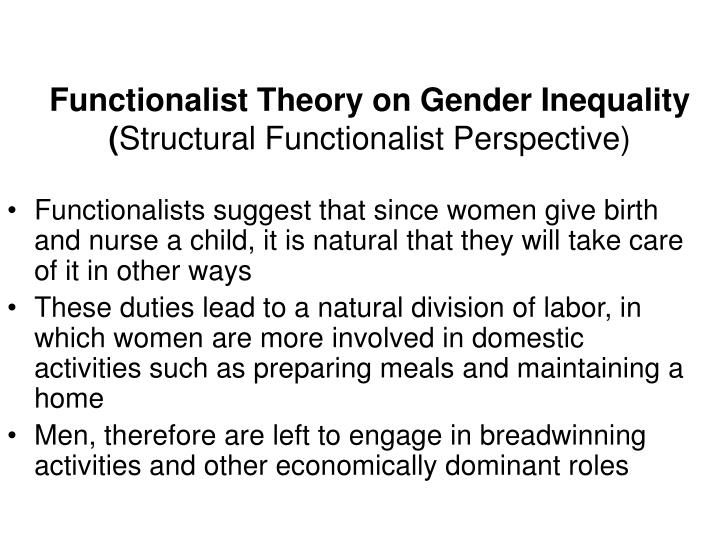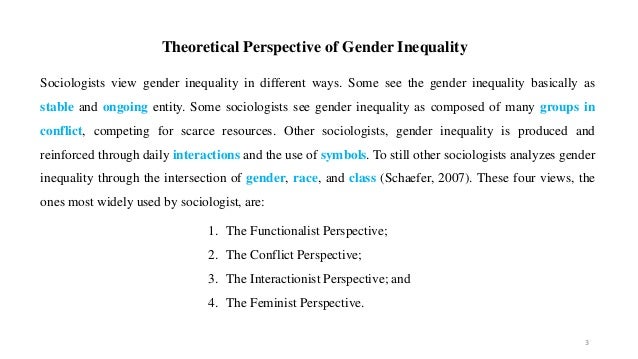
The perspective also receives criticism for slighting the influence of social forces and institutions on individual interactions. The functionalist perspective According to the functionalist perspective, also called functionalism, each aspect of society is interdependent and contributes to society's functioning as a whole. The government, or Sociological theories help to explain complex human behaviors, social phenomena, and social structures. To take a specific example, let’s consider how each theoretical perspective might explain the gender wage gap. In , full-time working women made cents to every dollar earned by men, meaning there is a gender wage gap of percent Apr 03, · The Functionalist analysis of crime starts with society as a whole. It seeks to explain crime by looking at the nature of society, rather than at individuals. There are two main thinkers usually associated with the Functionalist Perspective on Crime: Emile Durkheim and Robert Merton
Three Major Perspectives in Sociology
The pioneering European sociologists, however, also offered a broad conceptualization of the fundamentals of society and its workings. Their views form the basis for today's theoretical perspectives, or paradigmswhich provide sociologists with an orienting framework—a philosophical position—for asking certain kinds of questions about society and its people, functionalist perspective gender inequality.
Sociologists today employ three primary theoretical perspectives: the symbolic interactionist perspective, the functionalist perspective, and the conflict perspective. These perspectives offer sociologists theoretical paradigms for explaining how society influences people, and vice versa. Each perspective uniquely conceptualizes society, social forces, and human behavior see Table 1.
According to the symbolic interactionist perspective, people attach meanings to symbols, and then they act according to their subjective interpretation of these symbols.
Verbal conversations, in which spoken words serve as the predominant symbols, make this subjective interpretation especially evident. Conversation is an interaction of symbols between individuals who constantly interpret the world around them.
Of course, anything can serve as a symbol as long as it refers to something beyond itself. Written music serves as an example, functionalist perspective gender inequality. The black dots and lines become more than mere marks on the page; they refer to notes organized in such a way as to make musical sense.
Thus, symbolic interactionists give serious thought to how people act, and then seek to determine what meanings individuals assign to their own actions and symbols, as well as to those of others. Consider applying symbolic interactionism to the American institution of marriage. American society attaches general meanings to these symbols, but individuals also maintain their own perceptions of what these and other symbols mean. Much faulty communication can result from differences in the perception of the same events and symbols.
The perspective also receives criticism for slighting the influence of social forces and institutions on individual interactions. Functionalists believe that society is held together by social consensusor cohesion, in which members of the society agree upon, and work together to achieve, what is best for society as a whole, functionalist perspective gender inequality.
Emile Durkheim suggested that social consensus takes one of two forms:. The functionalist perspective achieved its greatest popularity among American sociologists in the s and s. While European functionalists originally focused on explaining the inner workings of social order, American functionalists focused on discovering the functions of human behavior. Among these American functionalist sociologists is Robert Merton b. The manifest function of attending a church or synagogue, for instance, is to worship as part of a religious community, but its latent function may be to help members learn to discern personal from institutional values.
With common sense, manifest functions become easily apparent. Yet this is not necessarily the case for latent functions, which often demand a sociological approach to be revealed. A sociological approach in functionalism is the consideration of the relationship between the functions of smaller parts and the functions of the whole, functionalist perspective gender inequality.
Functionalism has received criticism for neglecting the negative functions of an event such as divorce. Critics also claim that the perspective justifies the status quo and complacency on the part of society's members.
Functionalism does not encourage people to take an active role in changing their social environment, even when such change may benefit them. Functionalist perspective gender inequality, functionalism sees active social change as undesirable because the various parts of society will compensate naturally for any problems that may arise.
Whereas American sociologists in the s and s generally ignored the conflict perspective in favor of the functionalist, the tumultuous s saw American sociologists gain considerable interest in conflict theory.
They also expanded Marx's idea that the key conflict in society was strictly economic. Today, functionalist perspective gender inequality theorists find social conflict between any groups in which the potential for inequality exists: racial, gender, functionalist perspective gender inequality, religious, political, functionalist perspective gender inequality, economic, and so on.
Conflict theorists functionalist perspective gender inequality that unequal groups usually have conflicting values and agendas, causing them to compete against one another. Critics of the conflict perspective point to its overly negative view of society. The theory ultimately attributes humanitarian efforts, altruism, democracy, functionalist perspective gender inequality, civil rights, and other positive aspects of society to capitalistic designs to control the masses, not to functionalist perspective gender inequality interests in preserving society and social order.
Previous Sociology in America. Next Complementary Perspectives in Sociology. Removing book from your Reading List will also remove any bookmarked pages associated with this title. Are you sure you want to remove bookConfirmation and any corresponding bookmarks? Literature Notes Test Prep Study Guides. Home Study Guides Sociology Three Major Perspectives in Sociology. All Subjects The Sociological Perspective Sociology in America Three Major Perspectives in Sociology Complementary Perspectives in Sociology An Integrated Perspective in Sociology Deducing with Sociological Imagination Sociology and Common Sense The Founders of Sociology Sociological Research Methods Scientific Method for Sociology Basic Sociological Research Concepts Sociological Research: Designs, Methods Ethics in Sociological Research Evaluating Sociological Research Sociology as Science Culture and Societies Cultural Values Cultural Norms Cultural Diversity Toward a Global Culture Types of Societies Culture and Society Defined Culture's Roots: Biological or Societal?
Sociological Perspective on Health Population and Urbanization Population and Demographic Variables Urbanization and Its Historical Stages Contemporary Mass Media Creating News and Culture Oversimplification and Stereotyping Violence and Pornography in the Media The Role and Influence of Mass Media Social Change and Functionalist perspective gender inequality Models of Social Change Technology and Social Change Environmentalism and Social Change Resisting Social Change Social Change Defined Social Movements.
Three Major Perspectives in Sociology. Sociology in America Three Major Perspectives in Sociology Complementary Perspectives in Sociology An Integrated Perspective in Sociology Deducing with Sociological Imagination Sociology and Common Sense The Founders of Sociology Scientific Method for Sociology Basic Sociological Research Concepts Sociological Research: Designs, Methods Ethics in Sociological Research Evaluating Sociological Research Sociology as Science Cultural Values Cultural Norms Cultural Diversity Toward a Global Culture Types of Societies Culture and Society Defined Culture's Roots: Biological or Societal?
Sociological Perspective on Health Population and Demographic Variables Urbanization and Its Functionalist perspective gender inequality Stages Creating News and Culture Oversimplification and Stereotyping Violence and Pornography in the Functionalist perspective gender inequality The Role and Influence of Mass Media Models of Social Change Technology and Social Functionalist perspective gender inequality Environmentalism and Social Change Resisting Social Change Social Change Defined Social Movements.
Adam Bede has been added to your Reading List! Ok Undo Manage My Reading list ×. Ok Manage My Reading list ×. Remove Cancel ×.
Theories of Gender: Crash Course Sociology #33
, time: 10:37Gender Equality in Saudi Arabia – ReviseSociology

Dec 20, · Marxist perspective by Sam Cook a former student Marxist perspective of education-revision notes Marx’s position about the ruling class was they have the power to control the working classes not with force but with ideas. These ideas justify their dominant position and conceal the true source of their power along with their exploitation of the Jan 22, · Saudi Arabia is well known for its high levels of gender inequality – and this week, Janice Turner pointed out that it is the only nation, in ‘flagrant disregard of the Olympic Charter, that will not be sending any women to the games. The rational for this is that exercise, according to the Saudi Religious Police, prompts girls to wear scanty clothes, mix with men and leave the house Apr 03, · The Functionalist analysis of crime starts with society as a whole. It seeks to explain crime by looking at the nature of society, rather than at individuals. There are two main thinkers usually associated with the Functionalist Perspective on Crime: Emile Durkheim and Robert Merton

No comments:
Post a Comment